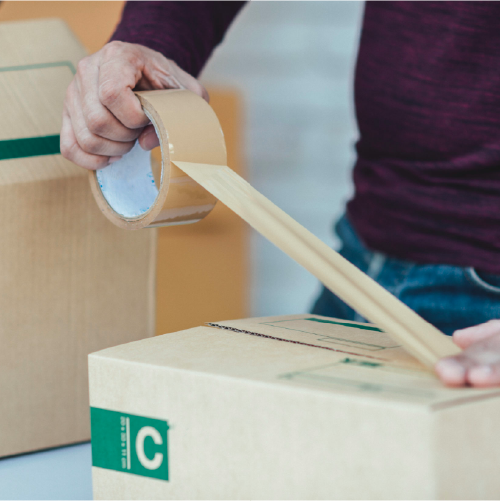
When COVID-19 forced retail stores to close, it sent online sales into overdrive. But while this solved a practical problem for locked-down households, the sudden surge created a huge increase in waste packaging for local authorities to manage.
As the world moves out of the pandemic, there are many restrictions we’ll leave behind. Yet the appetite for ecommerce is likely to remain strong. Council waste management teams need to think carefully about how to coordinate extra recycling it creates, to prevent ‘cardboard cities’ forming as the result of the online retail boom.
Changing consumer behaviours create cardboard waste
Ecommerce sales have been increasing steadily for the past decade, but the pandemic accelerated this growth beyond any predictions. Digital sales hit a 13-year high in 2020, with 46% of people ordering items online that they’d previously only ever bought in-store.
Getting products delivered to the doorstep proved a saving grace while non-essential retail stores were closed. But this change in consumer behaviour had a marked impact on waste management demands.
According to Simon Ellin, Chief Executive of the Recycling Association, there was a noticeable shift in materials recycling facilities (MRFs) workflow from commercial waste to domestic kerbside collections during the pandemic – exacerbated by the temporary closure of household waste recycling centres. Meanwhile, WRAP observed that the 25% year-on-year rise in recycling volumes between April 2019 and 2020 were mainly driven by cardboard.
It’s not just kerbside collections that were put under pressure from cardboard cities, either. The closure of waste centres led to more people using recycling points located in council and supermarket car parks during the pandemic. But, unable to keep up with the volume of cardboard being discarded, many of these drop-off points became overflowing eyesores, forcing local authorities to close them down while they caught up with excess waste.
Understanding the impact of ecommerce uptake
Excess packaging generated by the ecommerce boom created significant practical challenges for many council waste management teams during the pandemic. For example:
- The increase in individual household recycling volumes caused bigger logistical issues than coordinating large volumes of packaging from local businesses, because collection requirements were more widespread
- Many waste management teams needed to increase the frequency of their collections, lengthen their rounds, or add more trucks to keep pace with demand for services – a problem exacerbated by social distancing measures
- Some local authorities experienced capacity issues, diverting recyclable materials to different MFPs to prevent processing bottlenecks
- Overall recycling rates were affected, as many households started putting cardboard into general waste when they ran out of room in their recycling bin, or their improperly sorted recycling caused cardboard to become contaminated
Initially, council waste management teams were doing the best job possible in difficult circumstances. But as we recover and move forward from the pandemic, it’s time to develop a longer-term strategy for managing waste online packaging effectively.
Key tactics for sustainable improvement
With the ecommerce market set to expand at a compound annual growth rate (CAGR) of 17.2% between now and 2025, local authorities need sustainable systems in place to manage increasing cardboard waste. Key tactics include:
Communicating clearly and consistently with households – people think a few extra cardboard boxes won’t make much difference on recycling day; they don’t realise their cumulative impact on waste management services. Local authorities need to use marketing channels and resident apps to educate communities on the importance of being promptly and correctly sorting materials for recycling, to help staff manage collections effectively.
Basing strategic decisions on accurate data – many regional waste management teams still rely on spreadsheets or legacy systems to coordinate services, which don’t factor-in recent changes to refuse volumes or collection types. Upgrading to new municipal waste management technology will enable teams to analyse what’s happening across the region, making strategic decisions that better serve the community.
Keeping collection crews updated in real-time – in addition to improving data analysis, commercial waste management software enables office-based staff to communicate with collection crews in-cab during their rounds. This way, strategic staff know exactly what’s happening in the local area, and they can manage resources to stay on top of collections.
Creating and update emergency plans – while the ideal approach is to put workflows in place that manage refuse requirements week-to-week, sometimes things don’t go according to plan. By understanding the source of the problem and the resources available, waste management teams can create and action emergency responses, stopping any hiccups from impacting service continuity for local residents.
Recycling management fit for the future
The pressure is mounting for brands to find eco-friendly ways to manage ecommerce; 74% of people want online fashion retailers to reduce the amount of packaging they use, for example. But there’s always going to be a lag between demand and change – and even when companies improve packing materials, the popularity of online shopping is unlikely to fade.
These combined factors are putting pressure on local waste management services and pushing recycling facilities to their limit. And while small, temporary measures like diverting cardboard to a different MFP can keep on top of interim issues, council waste management teams need to embrace the advanced features of public sector waste management technology to optimise recycling management for the future.
Whitespace municipal waste management software empowers UK councils to keep on top of regional refuse requirements. Book a free demo to find out more.
